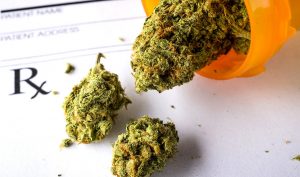In the early days of the pandemic, reports surfaced that found both beneficial and adverse consequences of using cannabis. Unfortunately, there is still ongoing debate about the benefits and risks of using cannabis products in conjunction with having COVID-19.
In one study designed to determine the anti-inflammatory properties of sativa with regard to controlling the “cytokine storm,” a cascade of exaggerated immune responses that can cause serious problems, especially with regard to the widespread vascular inflammatory process, the researchers concluded, “We noted that out of seven studied extracts of novel C. sativa cultivars, three (#4, #8 and #14) were the most effective, causing profound and concerted down-regulation of COX2, TNFα, IL-6, CCL2, and other cytokines and pathways related to inflammation and fibrosis.”
In other words, these cultivars, or marijuana extracts, inhibited the inflammatory response associated with the mere pernicious symptoms of COVID-19. However, these were in laboratory tissue samples that were subjected to UV exposure to trigger inflammation, not living patients with COVID-19. Therefore, any conclusions about their applicability to real-world settings may not be valid. In another study involving mice, the researchers found “a potential protective role for CBD during ARDS that may extend CBD as part of the treatment of COVID-19 by reducing the cytokine storm, protecting pulmonary tissues, and re-establishing inflammatory homeostasis.”
And in a research article titled, Immune Responses Regulated by Cannabidiol, the researchers concluded, “Overall, the data overwhelmingly support the notion that CBD is immune suppressive and that the mechanisms involve direct suppression of activation of various immune cell types, induction of apoptosis, and promotion of regulatory cells, which, in turn, control other immune cell targets.
In line with this conclusion, another study on airway inflammation, a serious outcome of COVID-19 infections for some people, the researchers concluded, “There was a significant and inverse correlation between CB1 levels and lung function in asthmatic patients. CBD treatment decreased the inflammatory and remodeling processes in the model of allergic asthma.”

Translation: CBD decreased airway inflammation, thereby improving respiratory function. This also likely means an overall improved outcome for some people who become hospitalized with extreme COVID-19 symptoms. Although more research is needed to determine the appropriate doses and protocols regarding cannabis as a treatment for COVID-19, the current pool of information is pointing to a positive role.
The role CBD and marijuana play in relation to COVID-19 may be more of an indirect one connected to anxiety. CBD, and for some people, marijuana, may offer a potent anti-anxiety agent to combat the stresses associated with the pandemic. In the article, SARS-CoV2 induced respiratory distress: Can cannabinoids be added to anti-viral therapies to reduce lung inflammation? The authors make a connection between the stressors endured during an Ebola outbreak and the stressors present in the current COVID-19 pandemic, stating:
“CBD has shown promise as an alternative therapy for the clinical management of anxiety disorders (Nichols and Kaplan, 2020). Based on its anxiolytic and anti-depressant properties, it has been suggested that CBD could be used to improve the mental and somatic health of patients suffering from anxiety and emotional stress after recovering from Ebola disease (Reznik et al., 2016). Like Ebola, patients recovering from COVID-19 may experience various psychological and social stressors that may be triggered by residual chronic inflammation and autoimmune reactions. Therefore, randomized clinical trials to test the efficacy of CBD on alleviating anxiety and fear associated with COVID-19 infection and its consequences on people’s physical, social and psychological well-being may be beneficial in the future.”
And a study with a focus on genetics may also point to another benefit of CBD. As reported in StudyFinds, “A team from the University of Chicago discovered that CBD inhibits the gene expression in virus cells, including the RNA coding for the spike protein.” The author of the study, Marsha Rosner, states, “To date, few therapies have been identified that block SARS-CoV-2 replication and viral production. This study highlights CBD, and its active metabolite, 7-OH-CBD, as potential preventative agents and therapeutic treatments for SARS-CoV-2 at early stages of infection.”
Yet, there are some precautions people should take before loading up from a dispensary. First, those who are experiencing respiratory stress may want to stay away from inhaling marijuana or CBD to prevent further inflation of their respiratory system. Dr. Samoon Ahmad, a professor of psychiatry at NYU Grossman School of Medicine warns, “I would err on the side of caution and recommend that individuals use tinctures or edibles should they choose to use cannabis, particularly if they have comorbidities associated with worse COVID-19 outcomes.”
Ahmad also raises concerns over an additional study that points to possible elevated rates of adverse outcomes for older patients using the synthetic drugs nabilone and dronabinol to treat severe breathing problems. However, Ahmad cautioned against drawing any hard conclusions, saying “This is indirect evidence and tenuous at best.”

The bottom line is that despite some interesting empirical evidence, much more clinical research is needed to determine whether cannabis is a net positive or negative. Despite the lack of clarity around the benefits of cannabis with regard to COVID-19, one thing is abundantly clear: Cannabis sales have increased significantly during the pandemic. As reported by the Business Insider, “The year of 2020 saw extraordinarily strong sales of legal cannabis in the US, up 46% from 2019 to a record $17.5 billion.”
In the state of Washington alone, the effects of the pandemic were profound. According to heraldnet.com, “In May, the state took in $47.4 million, a whopping 43.8% increase from the same period in 2019. August receipts reached $50.3 million, a new high for a single month, and were 41% higher than the previous year.” And a recent poll by Ganja Goddess indicated, “a lasting shift in consumer behavior as the pandemic goes on and consumer behaviors evolve, which is reflected in the more than 100 percent growth year-over-year we are experiencing.”
Beyond being a stress reliever, much of the surge in marijuana purchases likely had something to do with the lockdowns of 2020. Another survey conducted during this time period found “. . .a general increase in cannabis sales following stay-at-home orders issued in AK, CO, OR, and WA in late March 2020. In all four states, those increases were greater than the percent increases observed in the preceding two years.”
As marijuana becomes increasingly destigmatized, decriminalized, and in many cases, fully legalized, it would seem there would be a parallel shift in robust medical research. Unfortunately, federal law is a major inhibiting factor. As the authors of the research report, Challenges and Barriers in Conducting Cannabis Research point out:
“Despite these changes in state policy and the increasing prevalence of cannabis use and its implications for population health, the federal government has not legalized cannabis and continues to enforce restrictive policies and regulations on research into the health harms or benefits of cannabis products that are available to consumers in a majority of states. As a result, research on the health effects of cannabis and cannabinoids has been limited in the United States, leaving patients, health care professionals, and policy makers without the evidence they need to make sound decisions regarding the use of cannabis and cannabinoids. This lack of evidence-based information on the health effects of cannabis and cannabinoids poses a public health risk.”
Well, like Bob Dylan said, ”The times they are a-changin’;” just not in D.C.
At Newsweed.com, we adhere to three simple principles: truth, balance, and relatability. Our articles, podcasts, and videos strive to present content in an accurate, fair, yet compelling and timely manner. We avoid pushing personal or ideological agendas because our only agenda is creating quality content for our audience, whom we are here to serve. That is why our motto is ”Rolling with the times, straining for the truth.”
Your opinion matters. Please share your thoughts in our survey so that Newsweed can better serve you.
Charles Bukowski, the Los Angeles beat poet that captured the depravity of American urban life once said, “There is something about writing poetry that brings a man close to the cliff’s edge.” Newsweed is proud to stand in solidarity and offer you a chance to get close to the cliff’s edge with our first Power of Poetry Contest. Are you a budding bard, a versatile versifier, a rhyming regaler? Do you march to the beat of iambic pentameter, or flow like a river with free verse? If so, here’s your opportunity to put your mad poetic chops to the test. Enter our poetry contest for bragging rights and an opportunity to win some cash!

